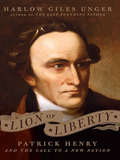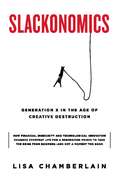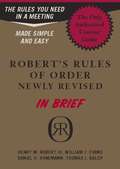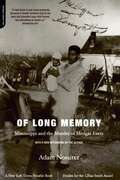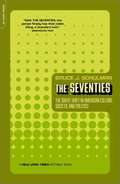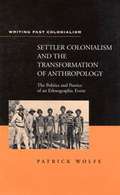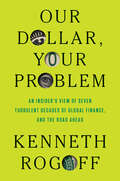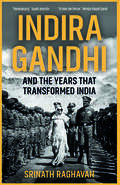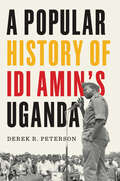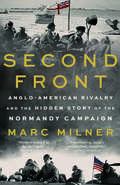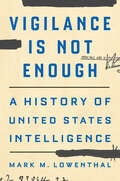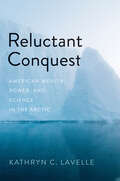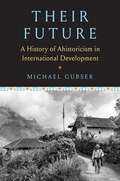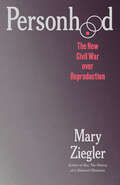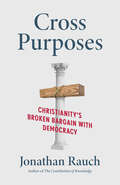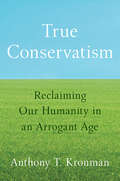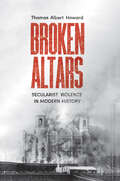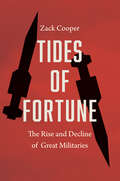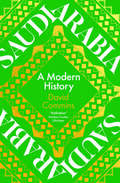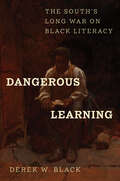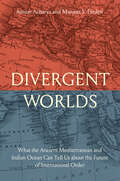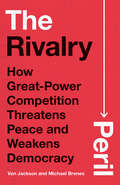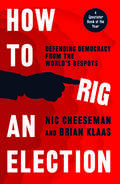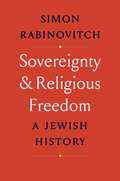- Table View
- List View
Lion of Liberty: Patrick Henry and the Call to a New Nation
by Harlow Giles UngerIn this action-packed history, award-winning author Harlow Giles Unger unfolds the epic story of Patrick Henry, who roused Americans to fight government tyranny—both British and American. Remembered largely for his cry for “liberty or death,” Henry was actually the first (and most colorful) of America’s Founding Fathers—first to call Americans to arms against Britain, first to demand a bill of rights, and first to fight the growth of big government after the Revolution. As quick with a rifle as he was with his tongue, Henry was America’s greatest orator and courtroom lawyer, who mixed histrionics and hilarity to provoke tears or laughter from judges and jurors alike. Henry’s passion for liberty (as well as his very large family), suggested to many Americans that he, not Washington, was the real father of his country. This biography is history at its best, telling a story both human and philosophical. As Unger points out, Henry’s words continue to echo across America and inspire millions to fight government intrusion in their daily lives.
Slackonomics: Generation X in the Age of Creative Destruction
by Lisa ChamberlainGeneration X grew up in the 1980s, when Alex P. Keaton was going to be a millionaire by the time he was thirty, greed was good, and social activism was deader than disco. Then globalization and the technological revolution came along, changing everything for a generation faced with bridging the analog and digital worlds. Living in a time of “creative destruction” – when an old economic order is upended by a new one – has deeply affected everyday life for this generation; from how they work, where they live, how they play, when they marry and have children to their attitudes about love, humor, happiness, and personal fulfillment. Through a sharp and entertaining mix of pop and alt-culture, personal narrative, and economic analysis, author Lisa Chamberlain shows how Generation X has survived and even thrived in the era of creative destruction, but will now be faced with solving economic and environmental problems on a global scale.
Robert's Rules Of Order Newly Revised In Brief
by Henry M. III Robert William J. Evans Daniel H. Honemann Thomas J. BalchGoing to a meeting? Want to know how to take part? Learn quickly and easily! This short, simple book includes: Sample dialogues to get you confidently through motions, nominations, elections, votes, debates, amendments, and more Invaluable tips for keeping meetings orderly and on track A chapter answering the most frequently asked questions Not sure what to do at a meeting? Handy tables at the back of the book tell you just what to say Appointed to a committee? Elected an officer or board member? Chosen as a convention delegate? Chapters on each clearly explain your duties
Of Long Memory: Mississippi and the Murder of Medgar Evers
by Adam NossiterThe history is well known: On June 12, 1963, Mississippi's courageous NAACP chief, Medgar Evers, was gunned down by white supremacist Byron de la Beckwith. Tried twice by all-white juries, Beckwith escaped conviction for three decades. But then Mississippi began to confront its tormented past. And in the 1990s, when Beckwith was sent to jail by a crusading young prosecutor, the family of Medgar Evers finally got justice. Hailed as a New York Times Notable Book of the Year and a finalist for the Lillian Smith Award, Of Long Memory reveals how this remarkable reversal took place. Nossiter uses the tools of memory, history, and reportage—and the clear vantage point of an outsider, a Northerner—to portray an entire state quite literally summoning up its ghosts. A new epilogue discusses other civil rights cases now being reconsidered, and skillfully shows how the South is finding a way to create justice where none had existed before.
The Seventies: The Great Shift in American Culture, Society, and Politics
by Bruce J. SchulmanSweeping away misconceptions about the "Me Decade, " Schulman offers a fast-paced, wide-ranging, and brilliant examination of the political, cultural, social, and religious upheavals of the 1970's.
Speaking of Pianists... (3rd edition)
by Abram ChasinsBiographies of many noted pianists, and essays on interpretation, concert management, recording, and the formidable demands of a career as a concert pianist.
Settler Colonialism And The Transformation Of Anthropology: The Politics And Poetics Of An Ethnographic Event (Writing Past Colonialism)
by Patrick WolfeThis work analyzes the politics of anthropological knowledge from critical perspective that alters existing understandings of colonialism. At the same time, it produces insights into the history of anthropology. Organized around an historical reconstruction of the great anthropological controversy over doctrines of virgin birth, the book argues that the allegation a great deal about European colonial discourse and little if anything about indigenous beliefs. By means of an Australian example, the book shows not only that the alleged ignorance was an artifact of the anthropological theory that produced it, but also that the anthropology was an artifact of the anthropological theory that produced it, but also that the anthropology concerned has been closely tied into both the historical dispossession and the continuing oppression of native peoples. The author explores the links between metropolitan anthropological theory and local colonial politics from the 19th century up to the present, settler colonialism, and the ideological and sexual regimes that characterize it.
Our Dollar, Your Problem: An Insider's View of Seven Turbulent Decades of Global Finance, and the Road Ahead (The Henry L. Stimson Lectures Series)
by Kenneth RogoffA leading economist explores the global rise of the U.S. dollar and shows why its future stability is far from assured &“The central argument of Our Dollar, Your Problem—that the greenback&’s pre-eminence was never guaranteed and might plausibly be overturned—could hardly be more timely.&”—The Economist Our Dollar, Your Problem argues that America&’s currency might not have reached today&’s lofty pinnacle without a certain amount of good luck. Drawing in part on his own experiences, including with policymakers and world leaders, Kenneth Rogoff animates the remarkable postwar run of the dollar—how it beat out the Japanese yen, the Soviet ruble, and the euro—and the challenges it faces today from crypto and the Chinese yuan, the end of reliably low inflation and interest rates, political instability, and the fracturing of the dollar bloc. Americans cannot take for granted that the Pax Dollar era will last indefinitely, not only because many countries are deeply frustrated with the system, but also because overconfidence and arrogance can lead to unforced errors. Rogoff shows how America&’s outsized power and exorbitant privilege can spur financial instability—not just abroad but also at home.
Indira Gandhi and the Years that Transformed India
by Srinath RaghavanThe gripping story of Indira Gandhi&’s premiership—and the profound influence she had on India Indira Gandhi&’s ascent as prime minister of India in 1966 was entirely unforeseen. But she soon emerged as one of the most powerful political leaders of her times, who transformed the world&’s largest democracy. She served as prime minister for a remarkable fifteen years, leaving behind a complex and deeply controversial legacy. In this fascinating account, Srinath Raghavan tells the story of Indira Gandhi&’s political career and the momentous changes that India experienced under her leadership. From her tentative start in high office to her remarkable electoral victories, the dark days of the Emergency of 1975–77, and her assassination at the hands of her bodyguards in 1984, Raghavan sheds new light on her politics and government, as well as on her adversaries and critics. He shows how the 1970s were the hinge on which the history of the country turned—and how Indira Gandhi transformed the new postcolonial nation into the India of today.
A Popular History of Idi Amin's Uganda
by Derek R. PetersonHow Africa’s most notorious tyrant made his oppressive regime seem both necessary and patriotic Idi Amin ruled Uganda between 1971 and 1979, inflicting tremendous violence on the people of the country. How did Amin’s regime survive for eight calamitous years? Drawing on recently uncovered archival material, Derek Peterson reconstructs the political logic of the era, focusing on the ordinary people—civil servants, curators and artists, businesspeople, patriots—who invested their energy and resources in making the government work. Peterson reveals how Amin (1928–2003) led ordinary people to see themselves as front-line soldiers in a global war against imperialism and colonial oppression. They worked tirelessly to ensure that government institutions kept functioning, even as resources dried up and political violence became pervasive. In this case study of how principled, talented, and patriotic people sacrificed themselves in service to a dictator, Peterson provides lessons for our own time.
Second Front: Anglo-American Rivalry and the Hidden Story of the Normandy Campaign
by Marc MilnerA revelatory new account of the Second World War—and how bitter competition between the Allies would shape the postwar world In June 1944, an Allied army of British, American, and Canadian troops sought to open up a Second Front in Normandy. But they were not only fighting to bring the Second World War to an end. After decades of Anglo-American struggle for dominance, they were also contending with one another—to determine who would ascend to global hegemony once Hitler&’s armies fell. Marc Milner traces this bitter rivalry as it emerged after the First World War and evolved during the fragile peace which led to the Second. American media and domestic politics dominated the Allied powers&’ military strategy, overshadowing the contributions of Britain and the remarkably critical role played by Canada in establishing this Second Front. Culminating in the decisive Normandy campaign, Milner shows how the struggle for supremacy between Churchill and Roosevelt changed the course of the Second World War—and how their rivalry shaped our understanding of the Normandy campaign, and the war itself.
Vigilance Is Not Enough: A History of United States Intelligence
by Mark M. LowenthalA broad and deep survey of American intelligence from before the Revolution to the present Every nation has an intelligence apparatus—some means by which its top officials acquire needed information on sensitive issues. But each nation does it differently, influenced by its history, its geographical conditions, and its political traditions. In this book, Mark M. Lowenthal examines the development of U.S. intelligence to explain how and why the United States went from having no intelligence service to speak of to being the world&’s predominant intelligence power almost overnight, and he discusses the difficult choices involved in maintaining that dominance in a liberal democracy. Lowenthal describes how the lack of a tradition of spycraft both hindered and helped American efforts to develop intelligence services during and after the Second World War. He points to the political pragmatism—leading to difficult choices—with which most intelligence directors operated; the constant tension between security and civil liberties in a constitutional democracy; the tension between the need for secrecy and the accountability required for democratic governance; and the way the growing importance of technology changed both the methods and the objectives of intelligence gathering. Far more than simply an episodic history, this book offers an analysis of why American intelligence developed as it did—and what it has meant for the nation&’s and the world&’s politics.
Reluctant Conquest: American Wealth, Power, and Science in the Arctic
by Kathryn C. LavelleA comprehensive history of U.S. involvement in the Arctic, from the American Revolution through the acquisition of Alaska to the present day What drives American foreign relations in the Arctic? It is difficult to give a unified answer to this question because most histories of the region are divided between the Atlantic and Pacific coasts, Asian and European strategic interests, or federal government and Indigenous peoples&’ concerns, making it difficult to understand the connections among the environmental challenges, scientific understandings, strategic calculations, and governance relationships. Most Americans do not think of their country as an Arctic power, yet it is a region where the United States has had important ties throughout its history. In this sweeping study, from the founding of the country through the acquisition of Alaska to the present, Kathryn C. Lavelle considers American relations across the circumpolar North, incorporating discussions of economics, national security, and science that are conventionally separated. Lavelle argues that it is impossible to understand U.S. policy without a knowledge of American political development and of how scientific understandings have grown alongside studies of climate and other environmental issues. This history has important implications for future American policy regarding traditional national security and political economy, in addition to climate change and environmental cooperation.
Their Future: A History of Ahistoricism in International Development
by Michael GubserA compelling examination of how economic development projects ignore local history, and the effects of this shortsightedness Foreign aid planners rarely consider the history of the societies in which they work, an oversight noted in the development literature but rarely examined. Aid programs costing billions of dollars operate largely in a historical vacuum, divorced from the knowledge of what succeeded or failed in the past. Michael Gubser chronicles the varieties of ahistoricism in international development theory and practice since 1945. He traces the history of development ideas, analyzing key theoretical and policy statements to highlight the marginalization of history in favor of technical solutions to economic and social problems; and he examines aid programs in several developing countries to show how Western models of social and economic development have been applied and misapplied.
Personhood: The New Civil War over Reproduction
by Mary ZieglerThe next phase of the war over reproduction in America What&’s next for the battle over abortion? Mary Ziegler argues that simply undoing Roe v. Wade has never been the endpoint for the antiabortion movement. Since the 1960s, the larger goal has been to secure recognition of fetuses and embryos as persons under the Fourteenth Amendment of the U.S. Constitution, a step that the modern antiabortion movement argues would make liberal abortion laws unconstitutional. Personhood chronicles the internal struggles and changing ideas about race, sex, religion, war, corporate rights, and poverty that shaped the personhood struggle over half a century. The book explores how Americans came to take for granted that fetal personhood requires criminalization and suggests that other ways of valuing both fetal life and women&’s equality might be possible. Ziegler ultimately shows that the battle for personhood has long been about more than abortion: it has aimed to overhaul the regulation of in vitro fertilization, contraception, and the behavior of pregnant women; change the meaning of equality under the law; and determine how courts decide which fundamental rights Americans enjoy. This book is necessary reading for anyone seeking to understand the era launched by the reversal of Roe.
Cross Purposes: Christianity's Broken Bargain with Democracy (Politics and Culture)
by Jonathan RauchWhy the crisis of Christianity has become a crisis for democracy What happens to American democracy if Christianity is no longer able, or no longer willing, to perform the functions on which our constitutional order depends? In this provocative book, the award-winning journalist Jonathan Rauch—a lifelong atheist—reckons candidly with both the shortcomings of secularism and the corrosion of Christianity. Thin Christianity, as Rauch calls the mainline church, has been unable to inspire and retain believers. Worse, a Church of Fear has distorted white evangelicalism in ways that violate the tenets of both Jesus and James Madison. What to do? For answers, Rauch looks to a new generation of religious thinkers, as well as to the Church of Jesus Christ of Latter-day Saints, which has placed the Constitution at the heart of its spiritual teachings. In this timely critique Rauch addresses secular Americans who think Christianity can be abandoned, and Christian Americans who blame secular culture for their grievances. The two must work together, he argues, to confront our present crisis. He calls on Christians to recommit to the teachings of their faith that align with Madison, not MAGA, and to understand that liberal democracy, far from being oppressive, is uniquely protective of religious freedom. At the same time, he calls on secular liberals to understand that healthy religious institutions are crucial to the survival of the liberal state.
True Conservatism: Reclaiming Our Humanity in an Arrogant Age
by Anthony T. KronmanDrawing on the riches of the Western tradition, Anthony T. Kronman defends a humane conservativism for our enlightened age As the party of the left has grown more strident, its conservative critics have responded in kind. Each year conservatives do a poorer job of defending their position as a citadel of human values without lapsing into an angry assault on ideals that they and progressives share. It becomes harder to see the enduring appeal of a true conservatism that celebrates the worth of custom and inheritance; the splendor of what is excellent and rare; the expansive solidarity of our friendship with the dead; and the dignity, indeed necessity, of our longing for a connection to the eternal and divine—while affirming that these timeless human goods are compatible with the modern ideals of equality, toleration, and reasoned argument. In this bracing book, Anthony Kronman defends a conservative philosophy of life that respects our enlightened ideals but decries the damage their arrogant simplification causes in our moral, political, and spiritual lives. Drawing on the work of Aristotle, Cicero, Spinoza, Burke, Hume, Madison, Tocqueville, Lincoln, Arendt, Heidegger, and others, he argues that humanism is conservatism, today as in the past. He reminds us that our humbling parameters make possible every form of human greatness, every human glory, every human love worthy of the name.
Broken Altars: Secularist Violence in Modern History
by Thomas Albert HowardA sweeping history of the violence perpetrated by governments committed to extreme forms of secularism in the twentieth century A popular truism derived from the Enlightenment holds that violence is somehow inherent to religion, to which political secularism offers a liberating solution. But this assumption ignores a glaring modern reality: that putatively progressive regimes committed to secularism have possessed just as much and often a vastly greater capacity for violence as those tied to a religious identity. In Broken Altars, Thomas Albert Howard presents a powerful account of the misery, deaths, and destruction visited on religious communities by secularist regimes in the twentieth century. Presenting three principal forms of modern secularism that have arisen since the Enlightenment—passive secularism, combative secularism, and eliminationist secularism—Howard argues that the latter two have been especially violence-prone. Westerners do not fully grasp this, however, because they often mistake the first form, passive secularism, for secularism as a whole. But a disconcertingly more complicated picture emerges with the adoption of a broader global vision. Admitting different species of secularism, greater historical perspective, and case studies drawn from the former Soviet Union, Turkey, Mexico, Spain, Czechoslovakia, Albania, Mongolia, and China, among other countries, Howard calls into question the conventional tale of modernity as the pacifying triumph of secularism over a benighted religious past.
Tides of Fortune: The Rise and Decline of Great Militaries
by Zack CooperAn ambitious look at how the twentieth century&’s great powers devised their military strategies and what their implications mean for military competition between the United States and China How will the United States and China evolve militarily in the years ahead? Many experts believe the answer to this question is largely unknowable. But Zack Cooper argues that the American and Chinese militaries are following a well-trodden path. For centuries, the world&’s most powerful militaries have adhered to a remarkably consistent pattern of behavior, determined largely by their leaders&’ perceptions of relative power shifts. By uncovering these trends, this book places the evolving military competition between the United States and China in historical context. Drawing on a decade of research and on his experience at the White House and the Pentagon, Cooper outlines a novel explanation for how militaries change as they rise and decline. Tides of Fortune examines the paths of six great powers of the twentieth century, tracking how national leaders adjusted their defense objectives, strategies, and investments in response to perceived shifts in relative power. All these militaries followed a common pattern, and their experiences shed new light on both China&’s recent military modernization and America&’s potential responses.
Saudi Arabia: A Modern History
by David ComminsA major new history of Saudi Arabia, from its eighteenth-century origins to the present day Saudi Arabia is one of the wealthiest countries in the world, a major player on the international stage and the site of Islam&’s two holiest cities. It is also one of the world&’s only absolute monarchies. How did Saudi Arabia get to where it is today? In this comprehensive account, David Commins narrates the full history of Saudi Arabia from oasis emirate to present-day attempts to leap to a post-petroleum economy. Moving through the ages, Commins traces how the Saud dynasty&’s reliance on sectarianism, foreign expertise, and petroleum to stabilize power has unintentionally spawned secular and religious movements seeking accountability and justice. He incorporates the experiences of activists, women, religious minorities, Bedouin, and expatriate workers as the country transformed from subsistence agrarian life to urban consumer society. This is a perceptive portrait of Saudi Arabia&’s complex and evolving story—and a country that is all too easily misunderstood.
Dangerous Learning: The South's Long War on Black Literacy
by Derek W BlackThe enduring legacy of the nineteenth-century struggle for Black literacy in the American South Few have ever valued literacy as much as the enslaved Black people of the American South. For them, it was more than a means to a better life; it was a gateway to freedom and, in some instances, a tool for inspiring revolt. And few governments tried harder to suppress literacy than did those in the South. Everyone understood that knowledge was power: power to keep a person enslaved in mind and body, power to resist oppression. In the decades before the Civil War, Southern governments drove Black literacy underground, but it was too precious to be entirely stamped out. This book describes the violent lengths to which southern leaders went to repress Black literacy and the extraordinary courage it took Black people to resist. Derek W. Black shows how, from the beginning of the nineteenth century to the end of Reconstruction, literacy evolved from a subversive gateway to freedom to a public program to extend citizenship and build democratic institutions—and how, once Reconstruction was abandoned, opposition to educating Black children depressed education throughout the South for Black and white students alike. He also reveals the deep imprint those events had on education and how this legacy is resurfacing today.
Divergent Worlds: What the Ancient Mediterranean and Indian Ocean Can Tell Us About the Future of International Order
by Amitav Acharya Manjeet S. PardesiA study of why the ancient Mediterranean and Indian Ocean took different paths to peace and stability and its lessons for international order today In this book Amitav Acharya and Manjeet S. Pardesi compare the interplay of power and ideas in the ancient Mediterranean and Indian Ocean to explain why the two regions took divergent paths to peace and stability. While the ancient Mediterranean order was shaped by the hegemony of Rome, the Indian Ocean developed an open and inclusive international order without the dominance of any single power. Moreover, the Indian Ocean provides a more robust example of the peaceful spread of ideas and culture in contrast to the ancient Mediterranean, where Hellenization, or the spread of Greek ideas, was often accompanied by violence and imperialism. Applying the divergent experiences of the two regions, the authors argue that the history of the Indian Ocean before European colonization offers a more useful framework for reshaping world order as the U.S.- and Western-dominated Liberal International Order comes to an end. The Indian Ocean framework points to an alternative model of order building—a multiplex rather than a multipolar approach—that could sustain efforts to build peace and stability in the emerging Indo-Pacific region.
The Rivalry Peril: How Great-Power Competition Threatens Peace and Weakens Democracy
by Van Jackson Michael BrenesHow the U.S. policy of competition with China is detrimental to democracy, peace, and prosperity—and how a saner approach is possible For close to a decade, the U.S. government has been preoccupied with the threat of China, fearing that the country will &“eat our lunch,&” in the words of Joe Biden. The United States has crafted its foreign and domestic policy to help constrain China&’s military power and economic growth. Van Jackson and Michael Brenes argue that great-power competition with China is misguided and vastly underestimates the costs and risks that geopolitical rivalry poses to economic prosperity, the quality of democracy, and, ultimately, global stability. This in-depth assessment of the trade-offs and pitfalls of protracted competition with China reveals how such a policy exacerbates inequality, leads to xenophobia, and increases the likelihood of violence around the world. In addition, it distracts from the priority of addressing such issues as climate change while at the same time undercutting democratic pluralism and sacrificing liberty in the name of prevailing against an enemy &“other.&” Jackson and Brenes provide an informed and urgent critique of current U.S. foreign policy and a road map toward a saner, more democratically accountable strategy of easing tension and achieving effective diplomacy.
How to Rig an Election
by Nic Cheeseman Brian KlaasAn engrossing analysis of the pseudo-democratic methods employed by despots around the world to retain control Contrary to what is commonly believed, authoritarian leaders who agree to hold elections are generally able to remain in power longer than autocrats who refuse to allow the populace to vote. In this engaging and provocative book, Nic Cheeseman and Brian Klaas expose the limitations of national elections as a means of promoting democratization, and reveal the six essential strategies that dictators use to undermine the electoral process in order to guarantee victory for themselves. Based on their firsthand experiences as election watchers and their hundreds of interviews with presidents, prime ministers, diplomats, election officials, and conspirators, Cheeseman and Klaas document instances of election rigging from Argentina to Zimbabwe, including notable examples from Brazil, India, Nigeria, Russia, and the United States—touching on the 2016 election. This eye-opening study offers a sobering overview of corrupted professional politics, while providing fertile intellectual ground for the development of new solutions for protecting democracy from authoritarian subversion.
Sovereignty and Religious Freedom: A Jewish History
by Simon RabinovitchA comparative legal history of Jewish sovereignty and religious freedom, illuminating the surprising ways that collective and individual rights have evolved over the past two centuries It is a common assumption that in Israel, Jews have sovereignty, and in most other places where Jews live today, they have religious freedom instead. As Simon Rabinovitch shows in this original work, the situation is much more complicated. Jews today possess different kinds of legal rights in states around the world; some stem from religious freedom protections, and others evolved from a longer history of Jewish autonomy. By comparing conflicts between Jewish collective and individual rights in courts and laws across the globe, from the French Revolution to today, this book provides a nuanced legal history of Jewish sovereignty and religious freedom. Rabinovitch weaves key themes in Jewish legal history with the individual stories of litigants, exploring ideas about citizenship and belonging; who is a Jew; what makes a Jewish family; and how to define Jewish space. He uses recent court cases to explore problems of conflicting rights, and then situates each case in a wider historical context. This unique comparative history creates a global picture of modern legal development in which Jews continue to use the law to carve out surprising forms of sovereignty.
